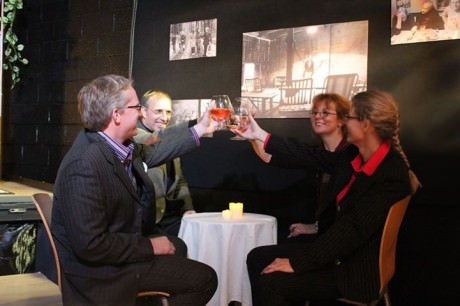Two friends sit in a study, sipping brandy. Both are intellectuals; one is a dissident, while the other has become a collaborator. Summarizing the state of television, one of the men laments, “Nothing but sterility and intrigues.” It’s a fitting description for this production of Protest, as Ambassador Theater presents an intellectually intriguing – if not emotionally satisfying – take on a modern classic.

Protest is the final event of the 2013 Mutual Inspirations Festival, celebrating the life and work of artist-dissident Václav Havel, and the final play in “Havel’s Trilogy.” Featuring Havel’s most lasting contribution to the theater, the partly autobiographical character of Ferdinand Vaněk became a national symbol. In Protest, Vanek (Michael Crowley) goes to visit his old friend Stanek (Ivan Zizek) – don’t worry, the similiarity in name is intentional. Where Vanek was recently jailed by the authorities for his political views, former comrade Stanek has reached an accord with the government and found himself a comfortable position writing for television. The two men mirror each other, each viewing the other as an object lesson in might-have-beens. Stanek wants Vanek’s help with a tricky political situation, hoping that his politically active friend will be willing to take all the risks.
The piece is interesting enough to foster hours of post-show conversation, but director Gail Humphries Mardirosian raises the intellectual stakes with her adaptation. Vanek and Stanek are joined by female counterparts Vankova (Sissel Banken) and Stankova (Hanna Bondarewska). Now there are mirrors facing mirrors, and as the characters react to each other we see multiple permutations of the same basic setup. Stankova is complacent in her accommodation with the government; Stanek is angrily defensive. Vanek seems to expect, and maybe understand his friend’s position; Vankova is visibly frustrated. If the characters are mirrors, Set Designer Jonathan Rushbrook has given them the perfect frame. In two studies on opposite ends of the space, the same conversations play and replay with different emotional tenors. Sometimes the actors trade partners, almost dancing their way through the cabaret-style seating in between the two stages. There’s a “What would you do?” hovering in Havel’s text, but Mardirosian won’t let the audience answer dismissively. Stanek’s complicity is not exceptional; neither is Vanek’s resistance. In a parallel world, two different people face the same choices and come to the same conclusions. Mardiroshian makes it clear that the play is an exploration of a whole society – maybe any society suffering under oppression – rather than just a single relationship.
Unfortunately, the production also pays some heavy costs for these decisions. The characters sometime alternate lines but most often the lines are repeated verbatim, first on one side of the room and then the other. In combination with slow pick-ups and the business of crossing the long, narrow space, it feels like Protest is thirty minutes of material squeezed into an hour and fifteen minutes. The production can feel like a tennis match, constantly requiring the audience to shift focus back and forth, and this takes its toll on the actors’ work as well. All the interruptions make the characters seem over-stylized, made of tiny snippets of mostly-natural dialogue. We’re never given enough time to really empathize with the characters – there’s too much to process, and the pieces we’re given are too small. The actors sometimes make eye contact or otherwise acknowledge the audience as they pass through the space, but the lack of connection means that’s the whole thing: an actor, making eye contact as they move from one place to another. Many of the production’s other little touches also seem ineffective. Patrons are provided trays of peanuts and mugs of Pilsner Urquell (things I always appreciate at the theatre), but to what dramatic end? Is it a connection to the brandy that Stanek/Stankova plies Vanek/Vankova with? A reference to Vanek/Vankova’s previous night on the town? There may have been a serious intent, but it wasn’t clear from the execution.
What’s left, at the end of the evening, is an intellectual examination of collaboration. Protest is unflinching in its treatment of hypocrisy, laying bare both the neurotic attachments that the middle class have to their creature comforts and the self-satisfaction that people get from making political gestures, however effective. Ambassador Theater’s work brilliantly illuminates the issues, but it lacks an emotional touch. Part of Havel’s greatness is that his works won’t let you forget that, at the core, any political situation is made up of people with their own lives and priorities. Protest is good, but that personal touch could have made it great.
Running Time: One hour and 15 minutes, with no intermission.
Protest plays through December 15, 2013 at Mead Theatre Lab at Flashpoint – 916 G Street, NW, in Washington, D.C. Purchase tickets online or call the box office at .





